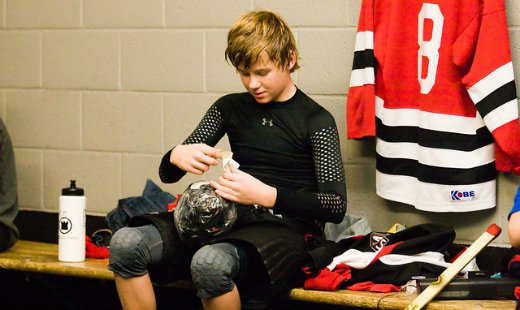
By Chris Stack
Are you a recruitable student-athlete? Do you know what it takes to be a recruitable student-athlete? Every college coach seeks different qualities or attributes in their recruits whether it be athletic, academic, or a specific psychological attribute. These characteristics vary from coach to coach depending on the sport, the school, the division, or the conference they compete in. In most cases, college coaches look at these four areas of a prospective student-athlete.
- Academics
- Athletics
- Attitude
- Character
Each coach will value each area differently. Are you interested in an Ivy League education? Those coaches may look at your academic profile before anything else. As you continue with the recruiting process, a coach will evaluate all four of these areas. As a prospective student-athlete, the more boxes you check, the better opportunities you will have to be a recruited student-athlete.
Academics
- What is your GPA?
- How difficult are the classes you’re taking?
- Have you taken the SATs or ACTs yet?
- Do you have the academic profile to succeed at the schools you’re interested in?
As a prospective student-athlete, you have to do your own research regarding the academic standards necessary to be accepted and to succeed in college. The academic quality of a student-athlete is extremely important in the recruitment process.
Paul Royal, Head Women’s Soccer Coach at LaSalle University, says, “if a player is academically sound, their options are limitless, academically, financially, and geographically, when they go to choose a school.”
College coaches aren’t necessarily looking for ‘A’ students all the time, but they need to see that a student has great work ethic and pride in their academics.
If a student shows that academics are a priority, college coaches will feel more comfortable recruiting them to be a part of their program.
Athletics
The athletic attributes of a prospective student-athlete play an integral role in the recruiting process. The Athletic aspect of recruiting can usually be broken down into three segments.
- Technical/Skill Set
- Tactics, Knowledge, and/or Strategy
- Athleticism or Physical Attributes
Whether it is sport specific, physical characteristics, or athleticism, college coaches tend to have certain needs for their programs.
- Do you possess the skills required to compete at that level?
- Are you a student of your sport?
- Are you constantly trying to improve as a player and increase your knowledge of your sport?
- What other athletic or physical characteristics do you possess?
- Do you have blazing speed, can you jump out of the gym, or do you have super strength?
What every recruit must understand is that a coach’s evaluation of your athletic ability is subjective; it is not relevant what your coaches or parents say, it’s up to the college coach to determine if you are the “right fit” for their program.
There are certain sports where statistics will tell the story of a prospective student-athlete’s ability. Are you a track star in the 100m dash? Your time will be the deciding factor on whether you can make an impact for that program. Are you a golfer? It’s straight forward, what are your average scores? However, for many programs, it’s the academic and psychological attributes that coaches will look at first.
Attitude
Attitude is how you carry yourself on and off the field. The attitude of a prospective student-athlete is an important aspect of the college recruiting process.
Jamion Christian, Head Men’s Basketball Coach at Mount St. Mary’s University, believes, “Psychological and emotional toughness are extremely important when trying to evaluate potential student-athletes. The sooner that a coach can understand the mental make-up of a player, the sooner they will be able to coach them into becoming the best version of themselves as a person.”
When a coach decides to evaluate a player, they are watching them both on and off the field, how do they interact with coaches, teammates, officials, and even their parents before and after the game. It’s important to understand that college coaches are watching you all of the time, and not just when you are in between the lines.
Another aspect of psychological attributes is how a prospective student-athlete handles pressure, success and failure.
Lindsey Munday, Head Women’s Lacrosse Coach at USC thinks, “A player’s mindset is what makes them successful at the next level. There will be ups and downs, what will a player do when their back is against the wall? Will they quit? Will they give up? Or will they buckle down and do whatever it takes to improve. Mindset is a skill and can be worked on, and I look for that in my recruits.”
Character
Lastly, and probably the most important attribute, is the character of a prospective student-athlete. College coaches recruit character, and it’s something that can make or break your chance to receive an athletic scholarship. There are many different definitions of character, but put simply, character is the mental and moral qualities distinctive to an individual.
John Wooden, famous UCLA Men’s basketball coach once said, “Sports do not build character, they reveal it.” In the new world that we live in, individuals portray their character all the time in the world of social media. College coaches have easy access to how you present yourself both on and off the field due to social media.
How you represent yourself and your team online is very important to a college coach, because how you represent yourself online is most likely very similar to how you act in real life.
There are many stories of prospective student-athletes or current student-athletes losing scholarships or being kicked off teams because of something they posted or tweeted. Be very careful of what you post, tweet, re-tweet, or even like. Avoid controversial topics like politics, race, religion, sexual orientation. Try to keep things positive.
If you possess the GFS 5 Pillars of Character there are not too many coaches who wouldn’t want to have a player like you in their program.
Accountability
Integrity
Loyalty
Trust
Leadership
As you go through the process remember, as much as coaches are recruiting you, you need to recruit them as well. Do your research. You are the only one who knows what the best fit is for you. Select the school that is right for you, and it’s not always about the money. Your goal is to get the best education to prepare yourself for a successful future.
CoachUp is the safest and easiest way to find a coach for personalized training. Find your perfect coach today and become the athlete you want to be!
Originally published on CoachUp Nation
Photo—MIKEMORRIS/Flickr
The post Four Qualities College Scouts Look for in a Recruit appeared first on The Good Men Project.
(via The Good Men Project)






